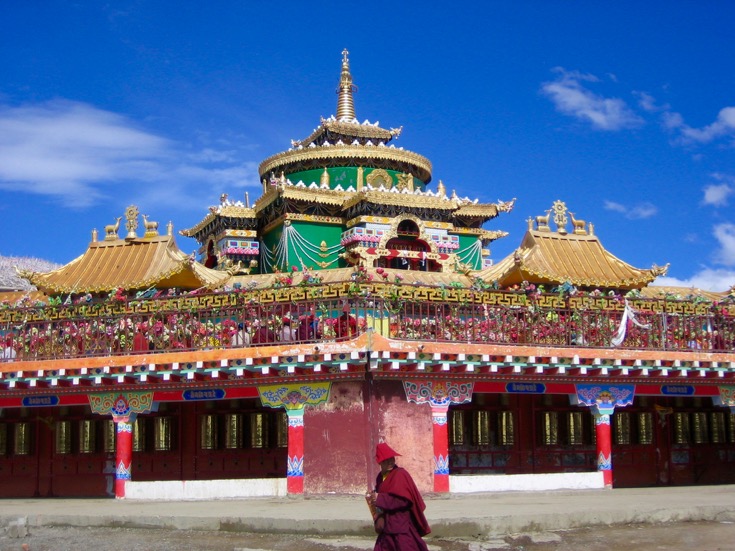Khi gặp phải thảm họa trong đời sống, ta có thể phản ứng theo hai cách. Hoặc là thất vọng và rơi vào thói xấu tự hủy hoại mình, hoặc vận dụng thách thức đó để tìm ra sức mạnh nội tại của mình. Nhờ vào những lời Phật dạy, tôi đã có thể chọn theo cách thứ hai. (When we meet real tragedy in life, we can react in two ways - either by losing hope and falling into self-destructive habits, or by using the challenge to find our inner strength. Thanks to the teachings of Buddha, I have been able to take this second way.)Đức Đạt-lai Lạt-ma XIV
Tôn giáo không có nghĩa là giới điều, đền miếu, tu viện hay các dấu hiệu bên ngoài, vì đó chỉ là các yếu tố hỗ trợ trong việc điều phục tâm. Khi tâm được điều phục, mỗi người mới thực sự là một hành giả tôn giáo.Đức Đạt-lai Lạt-ma XIV
Người duy nhất mà bạn nên cố gắng vượt qua chính là bản thân bạn của ngày hôm qua. (The only person you should try to be better than is the person you were yesterday.)Khuyết danh
Tôn giáo của tôi rất đơn giản, đó chính là lòng tốt.Đức Đạt-lai Lạt-ma XIV
Kẻ hung dữ hại người cũng như ngửa mặt lên trời mà phun nước bọt. Nước bọt ấy chẳng lên đến trời, lại rơi xuống chính mình.Kinh Bốn mươi hai chương
Vui thay, chúng ta sống, Không hận, giữa hận thù! Giữa những người thù hận, Ta sống, không hận thù!Kinh Pháp Cú (Kệ số 197)
Của cải và sắc dục đến mà người chẳng chịu buông bỏ, cũng tỷ như lưỡi dao có dính chút mật, chẳng đủ thành bữa ăn ngon, trẻ con liếm vào phải chịu cái họa đứt lưỡi.Kinh Bốn mươi hai chương
Sự toàn thiện không thể đạt đến, nhưng nếu hướng theo sự toàn thiện, ta sẽ có được sự tuyệt vời. (Perfection is not attainable, but if we chase perfection we can catch excellence.)Vince Lombardi
Khi gặp phải thảm họa trong đời sống, ta có thể phản ứng theo hai cách. Hoặc là thất vọng và rơi vào thói xấu tự hủy hoại mình, hoặc vận dụng thách thức đó để tìm ra sức mạnh nội tại của mình. Nhờ vào những lời Phật dạy, tôi đã có thể chọn theo cách thứ hai. (When we meet real tragedy in life, we can react in two ways - either by losing hope and falling into self-destructive habits, or by using the challenge to find our inner strength. Thanks to the teachings of Buddha, I have been able to take this second way.)Đức Đạt-lai Lạt-ma XIV
Nhẫn nhục có nhiều sức mạnh vì chẳng mang lòng hung dữ, lại thêm được an lành, khỏe mạnh.Kinh Bốn mươi hai chương
Bạn có thể lừa dối mọi người trong một lúc nào đó, hoặc có thể lừa dối một số người mãi mãi, nhưng bạn không thể lừa dối tất cả mọi người mãi mãi. (You can fool all the people some of the time, and some of the people all the time, but you cannot fool all the people all the time.)Abraham Lincoln
Trang chủ »» Danh mục »» SÁCH TẠP BÚT - TRUYỆN KÝ »» none »» Why Larung Gar, the Buddhist institute in eastern Tibet, is important »»
 Xem Mục lục
Xem Mục lục  Vietnamese || Đối chiếu song ngữ
Vietnamese || Đối chiếu song ngữ
![Văn học Phật giáo - Vì sao Học viện Phật Giáo Larung Gar miền Đông Tây tạng lại [có ảnh hưởng] quan trọng](https://cdn.pgvn.org/media/bookcover/127.jpg)

DO NXB LIÊN PHẬT HỘI PHÁT HÀNH
Mua sách qua Amazon sẽ được gửi đến tận nhà - trên toàn nước Mỹ, Canada, Âu châu và Úc châu.
Quý vị đang truy cập từ IP 216.73.216.157 và chưa ghi danh hoặc đăng nhập trên máy tính này. Nếu là thành viên, quý vị chỉ cần đăng nhập một lần duy nhất trên thiết bị truy cập, bằng email và mật khẩu đã chọn.
Chúng tôi khuyến khích việc ghi danh thành viên ,để thuận tiện trong việc chia sẻ thông tin, chia sẻ kinh nghiệm sống giữa các thành viên, đồng thời quý vị cũng sẽ nhận được sự hỗ trợ kỹ thuật từ Ban Quản Trị trong quá trình sử dụng website này.
Việc ghi danh là hoàn toàn miễn phí và tự nguyện.
Ghi danh hoặc đăng nhập